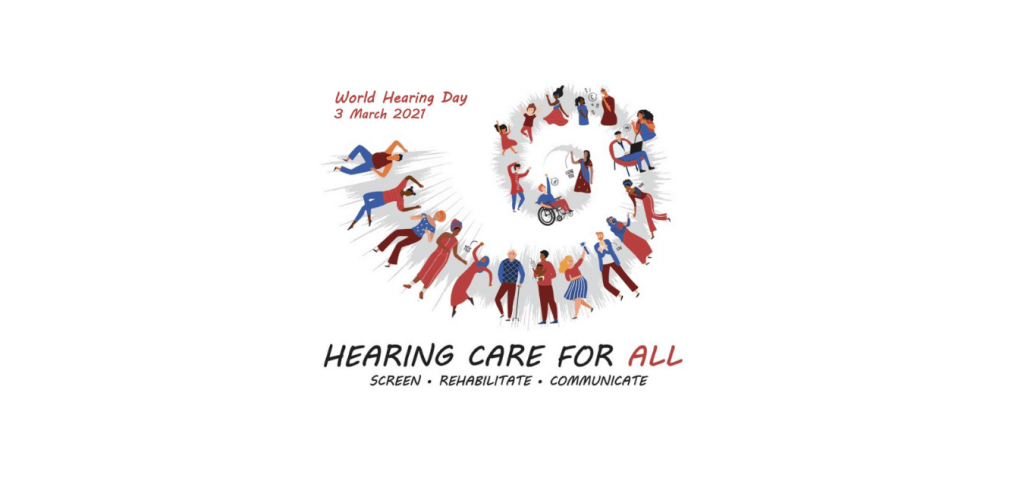World Hearing Day is on the 3rd March, and this year will mark the launch of the first-ever World Report on Hearing from WHO with a focus on Hearing Care for ALL.
We dive into why you’re never too young for a hearing test.
It’s true that your risk of hearing loss increases as you get older: the UK charity Action On Hearing Loss estimates that more than 40% of people over 50 have hearing loss, rising to 71% of people over the age of 70. But if you’re reading this and thinking “I’m too young to worry about hearing loss” – you’re wrong. It’s tempting to keep putting it off, but the reality is there’s no such thing as being ‘too young’ for a hearing test.
Our audiologists recommend a hearing test to anyone over the age of 25 or to anyone who is experiencing signs of hearing loss or changes to their hearing such as tinnitus symptoms.
The symptoms of hearing loss
It can be difficult to tell if you’re suffering from hearing loss, but common symptoms include:
- Difficulty hearing other people clearly.
- Having to turn up the volume on your TV and other devices.
- Asking people to repeat themselves.
- Finding it particularly difficult to understand conversation in noisy places.
If you recognise any of these symptoms, the best way forward is to book a FREE Full Hearing Assessment with your local audiologist.
Hearing loss doesn’t usually happen overnight, and most people find it difficult to notice any gradual changes in their own hearing. Often, the first people to notice a deterioration in your hearing sensitivity will likely be your partner or close friends. Pay attention if they notice any changes.
What’s involved in a hearing test?
Just like an eye test, a hearing test is a completely painless examination that’s over before you know it. And just like an eye test, it helps to have regular hearing tests so that any changes in your hearing test measurements can be monitored over time.
Our FREE Full Hearing Assessment includes:
- Background history and lifestyle assessment.
- Video otoscopy: photographing the outer ear, eardrum and canal in full colour. This is for checking the general health of the outer ear and looking for any possible issues (wax, perforations, infections etc)
- Pure tone audiometry to check your ability to hear a range of different sounds and determine whether there is a hearing loss (if any).
- Speech in quiet and in noise testing.
- A personal hearing health report.
You’ll receive your results in a personal hearing health report and a trained audiologist will run through it with you to help you understand exactly what the results mean. They will then be able to advise you on your next steps; whether this is to help you with noise protection, to help you choose the right hearing aid or any other issues that need addressing.
Choosing the right hearing aid
Gone are the days of bulky hearing aids, in the 21st-century hearing aids have transformed into super sleek and near-invisible devices packed full of tech. If your hearing test shows you will benefit from a hearing aid, there’s a whole market out there for you to pick from.
Brands such as Oticon offer a range of different devices including tiny in-ear devices, receiver in the canal aids. Your audiologist will advise you on the best fit for your ears, lifestyle and hearing needs and will help to make your solution as discrete as you want it to be. Some hearing aids are even compatible with your smartphone and other devices, letting you change settings and stream audio directly to your hearing aid.
Your audiologist will advise you on the best fit for your ears, lifestyle and hearing needs and will help to make your solution as discrete as you want it to be. The latest range of Oticon hearing aids, Oticon More™, include groundbreaking technology which helps you live life to the full and make more of every little detail, in perfect balance and clarity. Innovations such as Oticon’s MoreSound Intelligence™ allows you to hear with less effort and tune in to a higher quality, more natural sound.
Book a FREE Full Hearing Assessment today
If you’re worried about your hearing and over 18, then book yourself in for a hearing assessment. You can contact our friendly, Dedicated Patient Support team on 0800 52 00 546, book online.
Looking to find your nearest practice, take a look at our practices.

